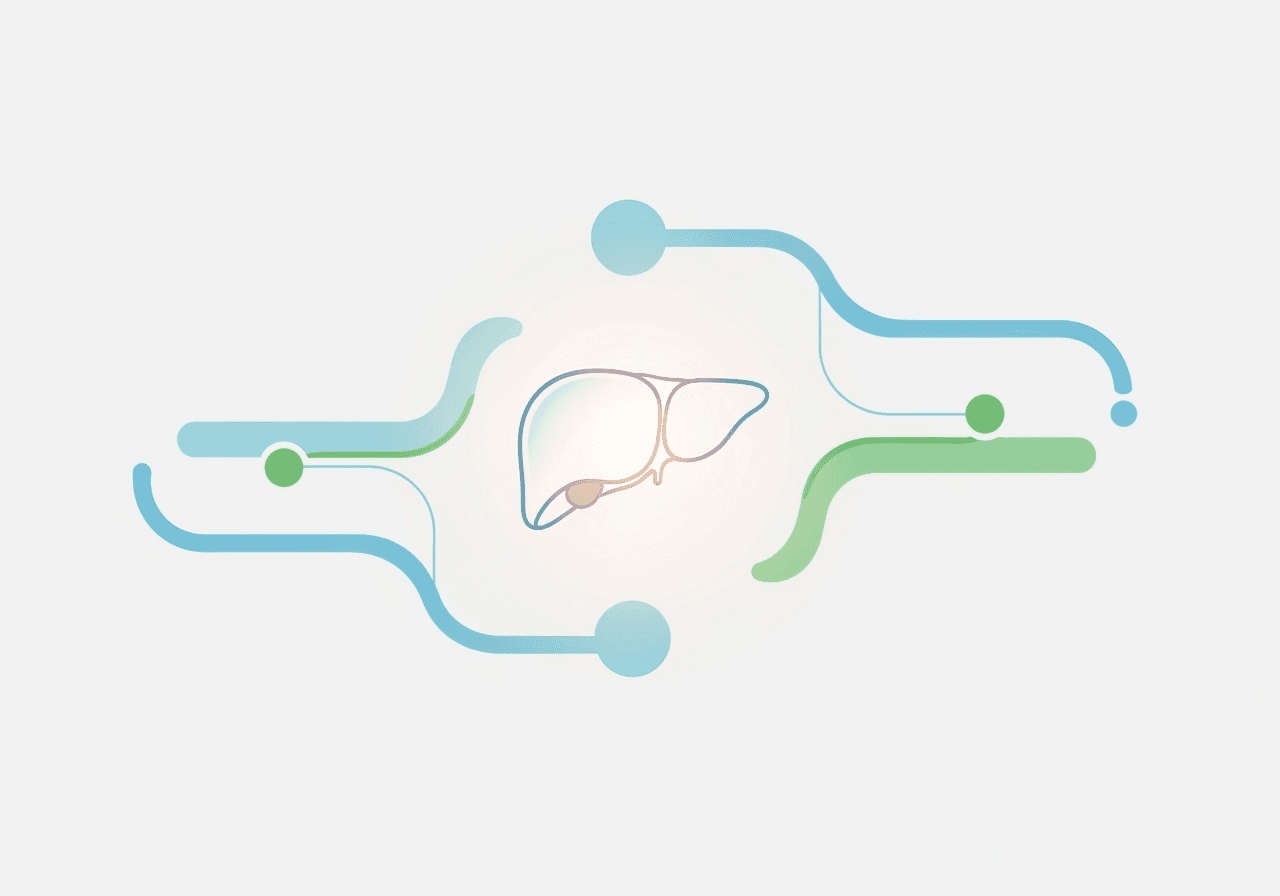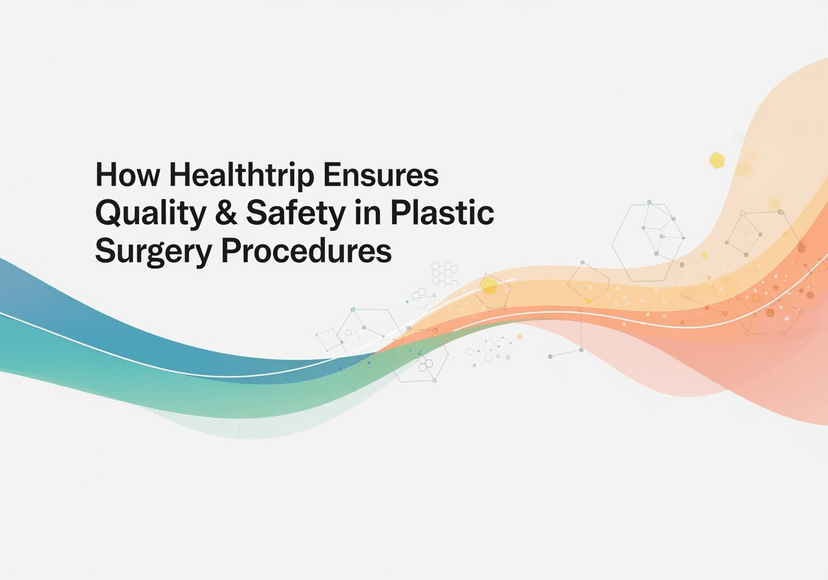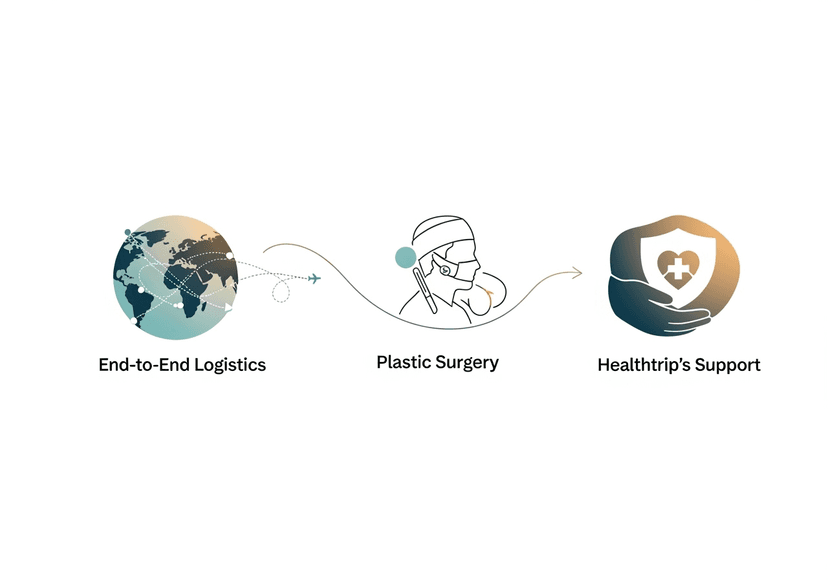
Is Liver Transplant Right for You? Healthtrip Explains Evaluation Steps
15 Oct, 2025
 Healthtrip
Healthtrip- < li>Who Needs a Liver Transplant? Identifying Potential Candidates < li>Why is a Liver Transplant Necessary? Understanding Liver Failure
- Where to Seek a Liver Transplant Evaluation? Hospitals and Centers
- The Liver Transplant Evaluation Process: A Step-by-Step Guide
- Real-Life Examples: Liver Transplant Success Stories
- Challenges and Considerations in Liver Transplantation
- Conclusion: Making an Informed Decision About Liver Transplantation
Understanding Liver Transplant Eligibility
Determining eligibility for a liver transplant involves a thorough and multifaceted evaluation process. It’s not just about having a sick liver; doctors need to assess your overall health and likelihood of benefiting from the surgery. Generally, candidates are individuals with end-stage liver disease whose condition cannot be managed with other treatments. This might include people with cirrhosis due to hepatitis, alcohol abuse, or genetic conditions, as well as those with liver cancer that meets specific criteria. At hospitals like Vejthani Hospital in Bangkok and Saudi German Hospital Cairo, Egypt, the medical teams look at the severity of your liver disease using scoring systems like the Model for End-Stage Liver Disease (MELD) score. This score helps prioritize patients on the transplant waiting list based on the urgency of their need. Besides the MELD score, doctors also consider other factors such as your age, overall health, and the presence of any other medical conditions. For instance, serious heart or lung disease might make you a less suitable candidate due to the risks associated with major surgery. It’s also crucial to have a strong support system, as the recovery process requires significant assistance from family and friends. Healthtrip facilitates connections with renowned transplant centers globally, ensuring you receive a comprehensive evaluation from experts in the field.
Most popular procedures in India
Initial Consultation and Medical History Review
The first step in the liver transplant evaluation process is typically an initial consultation with a transplant hepatologist, a doctor specializing in liver diseases. This meeting is crucial for establishing a relationship with your medical team and understanding the road ahead. During the consultation, the doctor will delve into your medical history, asking detailed questions about your past illnesses, surgeries, and current medications. Be prepared to provide comprehensive information, as this helps the medical team build a complete picture of your health. They will also inquire about your lifestyle habits, such as alcohol and tobacco use, as these factors can significantly impact the success of a transplant. The doctor will examine your previous medical records, including imaging scans and lab results, to assess the extent of your liver damage and identify any potential complications. This is also your opportunity to ask questions and express any concerns you may have about the transplant process. Healthtrip can assist you in scheduling this initial consultation at leading hospitals like Fortis Hospital, Noida, or Memorial Bahçelievler Hospital, ensuring you have access to the best medical expertise right from the start. Remember, this consultation is a two-way street, so come prepared with a list of questions and don’t hesitate to voice your thoughts.
Wellness Treatments
Give yourself the time to relax
Lowest Prices Guaranteed!

Lowest Prices Guaranteed!
Comprehensive Medical Evaluation
The comprehensive medical evaluation is a deep dive into your overall health, designed to identify any potential risks and ensure you’re a suitable candidate for a liver transplant. This involves a battery of tests and assessments, each aimed at evaluating different aspects of your physical and mental well-being. Blood tests are a cornerstone of the evaluation, providing insights into your liver function, kidney function, and blood clotting ability. Imaging studies, such as CT scans and MRIs, offer detailed views of your liver and surrounding organs, helping doctors assess the extent of liver damage and detect any signs of cancer. A cardiac evaluation, which might include an EKG and echocardiogram, assesses your heart health, ensuring it can withstand the stress of surgery. Pulmonary function tests evaluate your lung capacity and identify any respiratory issues that could complicate the transplant process. Psychological and social evaluations are also crucial, as they assess your mental health, coping skills, and support system. Hospitals like Quironsalud Hospital Murcia and Yanhee International Hospital use these evaluations to ensure that you are mentally prepared for the transplant and have the necessary support to navigate the recovery process. Healthtrip facilitates these evaluations by coordinating appointments and ensuring that all test results are readily available to your medical team, streamlining the process and reducing your stress.
Psychological and Social Assessment
Undergoing a liver transplant is not only a physical journey but also an emotional and psychological one. The psychological and social assessment is a vital component of the evaluation process, focusing on your mental and emotional preparedness for the transplant. This assessment typically involves meeting with a psychologist or psychiatrist who specializes in transplant patients. They will explore your coping mechanisms, stress levels, and any history of mental health issues. The goal is to ensure that you have the emotional resilience to handle the challenges of surgery, recovery, and long-term medication management. The social assessment focuses on your support system. A social worker will evaluate your living situation, financial stability, and the availability of family and friends to provide assistance. A strong support network is crucial for a successful recovery, as you’ll need help with transportation, medication management, and emotional support. The assessment also considers your adherence to medical advice. Doctors need to be confident that you’ll follow the post-transplant care plan, which includes taking medications as prescribed and attending regular follow-up appointments. At facilities like NMC Specialty Hospital, Al Nahda, Dubai, and Taoufik Clinic, Tunisia, the medical teams emphasize the importance of this assessment to ensure comprehensive care. Healthtrip recognizes the significance of mental and emotional well-being and will connect you with resources and support groups to aid in your journey.
The Transplant Selection Committee
After completing all the evaluations, your case is presented to the transplant selection committee. This committee is a multidisciplinary team of experts, including transplant surgeons, hepatologists, psychologists, social workers, and other specialists. They meticulously review your medical history, test results, and assessment reports to determine whether a liver transplant is the right course of action. The committee considers several factors, including the severity of your liver disease, your overall health, your psychological well-being, and the availability of a suitable donor liver. They also assess your ability to adhere to the post-transplant care plan, which includes taking medications, attending follow-up appointments, and making lifestyle changes. The committee’s decision is based on a consensus, ensuring that all aspects of your case are thoroughly considered. If the committee approves you for transplant, you’ll be placed on the national transplant waiting list. The waiting time can vary depending on several factors, including your blood type, MELD score, and the availability of donor livers in your region. Healthtrip aids by providing guidance and support throughout this waiting period, keeping you informed about the process and connecting you with resources to manage your health. Hospitals like Mount Elizabeth Hospital and Singapore General Hospital have experienced transplant committees that carefully evaluate each case to maximize the chances of a successful outcome.
Understanding the Waiting List
Once you've been approved for a liver transplant and placed on the waiting list, it's natural to feel a mix of hope and anxiety. Understanding how the waiting list works can help alleviate some of the uncertainty. In most countries, the waiting list is managed by a national organization like the United Network for Organ Sharing (UNOS) in the United States. Patients are prioritized based on their MELD score (Model for End-Stage Liver Disease) or PELD score (Pediatric End-Stage Liver Disease) for children. These scores reflect the severity of your liver disease and your risk of dying without a transplant. The higher your score, the higher you are on the list. When a donor liver becomes available, it's matched to potential recipients based on blood type, body size, and geographical location. The patient with the highest priority who is a suitable match is then contacted. The waiting time for a liver transplant can vary widely, depending on factors like your blood type, MELD score, and the availability of donor livers in your region. During this time, it's crucial to maintain close communication with your transplant team and follow their recommendations for managing your health. You'll need to attend regular check-ups, take your medications as prescribed, and make any necessary lifestyle changes. Healthtrip can help you stay organized and informed throughout the waiting period, providing resources and support to manage your health and reduce stress. Hospitals like LIV Hospital, Istanbul, and Bangkok Hospital provide comprehensive support to patients on the waiting list, ensuring they receive the best possible care.
Who Needs a Liver Transplant? Identifying Potential Candidates
Determining who needs a liver transplant is a complex process, one that requires careful evaluation and consideration. It's not simply a matter of a liver being "bad"; it's about understanding the extent of the damage, the potential for other treatments, and the overall health of the patient. Think of it like this: your liver is like the engine of your car. If it's sputtering a bit, a tune-up might do the trick. But if it's completely blown, you're looking at a major overhaul – in this case, a transplant. So, who are the folks whose engines are beyond repair? Generally, individuals with end-stage liver disease due to various causes, are considered. This could include chronic conditions like cirrhosis caused by hepatitis B or C, or long-term alcohol abuse. Autoimmune diseases like primary biliary cholangitis or autoimmune hepatitis can also lead to liver failure. Sometimes, it's a genetic quirk like hemochromatosis (where the body absorbs too much iron) or Wilson's disease (where copper accumulates in the liver). And then there are the sudden, acute liver failures, often triggered by drug overdoses (like acetaminophen) or viral infections. Identifying these potential candidates isn't as simple as reading a checklist, it requires a thorough medical evaluation to see all the nuances and specifics of the case. Healthtrip can help connect you with specialists experienced in these evaluations, ensuring a comprehensive understanding of your situation. We provide access to a network of globally recognized hospitals and specialists, facilitating the initial steps toward determining transplant eligibility. Imagine having a dedicated team to guide you through the complexities of medical terminology and connect you with the right experts – that's the kind of support Healthtrip aims to provide, making a difficult journey a little less daunting.
Why is a Liver Transplant Necessary? Understanding Liver Failure
Liver failure isn't just a medical term; it's a life-altering condition where the liver, that unsung hero of our internal organs, gradually loses its ability to function. Think of your liver as a bustling factory, constantly processing nutrients, filtering toxins, and producing essential substances. When that factory starts to break down, the consequences can be dire. A liver transplant becomes necessary when the liver's functions are so severely compromised that the body can no longer sustain itself. This can happen due to a variety of reasons, including chronic infections like hepatitis B and C, which, over time, scar the liver, leading to cirrhosis. Excessive alcohol consumption, non-alcoholic fatty liver disease (NAFLD), and autoimmune diseases are other common culprits. But why is a failing liver so dangerous? Well, it's responsible for crucial tasks like removing waste products from the blood, producing clotting factors, and storing energy. When it falters, toxins build up, leading to confusion and even coma (hepatic encephalopathy). Blood clotting becomes impaired, increasing the risk of severe bleeding. Fluid accumulates in the abdomen (ascites), causing discomfort and breathing difficulties. In essence, liver failure is like a domino effect that can trigger a cascade of health problems. When these complications become unmanageable with conventional treatments, a liver transplant offers a chance at survival and a return to a more normal life. Understanding the gravity of liver failure highlights the importance of timely intervention. Healthtrip can assist you in finding the best medical facilities and specialists equipped to handle complex cases of liver failure and guide you through the transplant process. For instance, facilities like Fortis Memorial Research Institute in Gurgaon, India, and Mount Elizabeth Hospital in Singapore offer comprehensive liver transplant programs. We aim to bridge the gap between you and world-class medical care, providing the support and resources you need to navigate this challenging journey.
Where to Seek a Liver Transplant Evaluation? Hospitals and Centers
Finding the right place for a liver transplant evaluation is a crucial step, almost like finding the right guide for a difficult expedition. You need expertise, experience, and a supportive environment. Not all hospitals are created equal when it comes to liver transplants. You want a center with a dedicated transplant team, including hepatologists, surgeons, transplant coordinators, and social workers, all working together seamlessly. These centers should have a proven track record of successful transplants and offer comprehensive pre- and post-transplant care. Look for hospitals with advanced diagnostic capabilities and access to innovative therapies. For example, Fortis Memorial Research Institute in Gurgaon and Max Healthcare Saket in Delhi are known for such comprehensive programs. Internationally, centers like Singapore General Hospital and Mount Elizabeth Hospital in Singapore, along with hospitals like Memorial Sisli Hospital in Istanbul, offer world-class transplant services. The evaluation process itself involves a series of tests and assessments to determine your suitability for a transplant. The medical team will assess the severity of your liver disease, evaluate your overall health, and look for any potential contraindications. They'll also discuss the risks and benefits of transplantation, as well as the long-term commitment required for post-transplant care. It's a thorough process, and it's designed to ensure the best possible outcome. Seeking a second opinion is always a good idea, especially when it comes to major medical decisions like a liver transplant. Healthtrip can help you connect with multiple transplant centers, providing you with the information you need to make an informed choice. We understand that this is a significant decision, and we're here to support you every step of the way. By providing access to a global network of reputable hospitals and specialists, Healthtrip empowers you to find the center that best suits your individual needs and circumstances.
Also Read:
The Liver Transplant Evaluation Process: A Step-by-Step Guide
Embarking on the liver transplant journey begins with a comprehensive evaluation, a critical phase designed to assess your suitability for this life-saving procedure. This process isn’t just about ticking boxes; it’s a deep dive into your overall health, ensuring that a transplant is the most viable option and that you’re prepared for the road ahead. Think of it as a collaborative effort between you and a dedicated team of medical professionals, all working together to determine the best course of action. The evaluation typically starts with a thorough review of your medical history. Be prepared to share details about past illnesses, surgeries, medications you're currently taking, and any family history of liver disease. This information provides the transplant team with a foundational understanding of your health status. Next comes a series of diagnostic tests. Blood tests are crucial to evaluate liver function, kidney function, and screen for infections. Imaging studies, such as ultrasounds, CT scans, or MRIs, provide detailed images of your liver and surrounding organs, helping doctors assess the extent of liver damage and identify any potential complications. This is where hospitals like Fortis Memorial Research Institute, Gurgaon and Max Healthcare Saket shine, equipped with state-of-the-art technology to deliver accurate and timely results.
Beyond the medical aspects, the evaluation also considers your psychological and social well-being. Meeting with a psychiatrist or psychologist is a standard part of the process. This is to assess your mental and emotional readiness for the transplant, as the journey can be emotionally taxing. They'll evaluate your coping mechanisms, support system, and ability to adhere to the strict post-transplant regimen. Social workers also play a vital role, evaluating your social support network and financial resources. They'll help you navigate the logistical challenges of transplantation, such as housing during the transplant process, financial assistance programs, and connecting you with support groups. Keep in mind, this evaluation isn't a judgment; it's about ensuring you have the necessary support to thrive after the transplant. Your commitment to lifestyle changes is also a key factor. The transplant team will assess your willingness to abstain from alcohol and tobacco, maintain a healthy diet, and adhere to a strict medication schedule. These lifestyle changes are crucial for the long-term success of the transplant. The evaluation process can take several weeks or even months to complete, as the transplant team gathers all the necessary information. Once the evaluation is complete, the transplant team will meet to discuss your case and determine whether you are a suitable candidate for a liver transplant. They'll consider all aspects of your health, including the severity of your liver disease, your overall health status, your psychological and social well-being, and your commitment to lifestyle changes.
The transplant team might include doctors from hospitals like Mount Elizabeth Hospital or Bangkok Hospital who are dedicated to providing comprehensive care throughout the entire transplant process. If you are approved for a transplant, you'll be placed on a waiting list. The waiting time can vary depending on several factors, including the severity of your liver disease, your blood type, and the availability of donor organs. While waiting, it's crucial to maintain regular check-ups with your transplant team and continue to adhere to their recommendations. This will help ensure that you remain in the best possible health for when a donor organ becomes available. Remember, the liver transplant evaluation is a significant step in your journey toward a healthier future. It's a chance to gain a deeper understanding of your health and work collaboratively with a team of dedicated professionals. By actively participating in the process and providing honest and open communication, you can help ensure the best possible outcome.
Also Read:
Real-Life Examples: Liver Transplant Success Stories
Hearing about real-life liver transplant success stories can be incredibly inspiring, offering hope and reassurance to those considering or awaiting the procedure. These stories highlight the transformative impact a liver transplant can have on an individual's life, showcasing the resilience of the human spirit and the advancements in modern medicine. Let's delve into a few examples that paint a vivid picture of the possibilities. Consider the story of Sarah, a vibrant 45-year-old who battled primary biliary cholangitis (PBC), a chronic liver disease, for over a decade. Despite managing her condition with medication, her liver function gradually declined, leaving her fatigued, jaundiced, and struggling to maintain her active lifestyle. After undergoing a thorough evaluation at a leading transplant center, similar to those found within the Healthtrip network, Sarah was placed on the deceased donor waiting list. After an anxious wait of 10 months, she received the life-changing call. The transplant surgery was a success, and Sarah diligently followed her post-transplant care plan, adhering to her medication schedule and attending regular follow-up appointments. Within a few months, her energy levels soared, her jaundice disappeared, and she was able to return to her beloved hobbies, including hiking and gardening. Sarah's story is a testament to the power of liver transplantation in restoring quality of life and allowing individuals to reclaim their passions.
Then there's the case of David, a young father in his early 30s who was diagnosed with autoimmune hepatitis, a condition where the body's immune system attacks the liver. David's condition progressed rapidly, leading to cirrhosis and liver failure. He faced a daunting prospect, as his health deteriorated quickly, impacting his ability to work and care for his young children. After being evaluated at a hospital renowned for its transplant expertise, such as Fortis Hospital, Noida or LIV Hospital, Istanbul, David was deemed a suitable candidate for a liver transplant. Fortunately, a living donor, his sister, stepped forward, offering a portion of her liver to save his life. The living donor transplant surgery was a success, and both David and his sister recovered well. David was able to return to work, actively participate in his children's lives, and enjoy a renewed sense of hope and gratitude. David's story illuminates the incredible impact of living donor liver transplantation, showcasing the selfless act of donation and the profound bond between family members.
These stories, while unique in their details, share a common thread: the transformative power of liver transplantation in restoring health, hope, and quality of life. They underscore the importance of early diagnosis, timely referral to a transplant center, and adherence to post-transplant care. While the journey is undoubtedly challenging, these success stories serve as a beacon of hope, reminding us that a brighter future is possible for those facing liver failure. Moreover, these narratives highlight the critical role of organ donation, both deceased and living, in providing life-saving opportunities for individuals in need. By raising awareness about organ donation and encouraging individuals to register as donors, we can collectively contribute to saving lives and transforming the lives of countless others. These stories also emphasize the importance of choosing a reputable transplant center with experienced surgeons and a dedicated transplant team. Hospitals like Singapore General Hospital and Jiménez Díaz Foundation University Hospital have a proven track record of successful liver transplants, offering patients the best possible chance of a positive outcome. Through these real-life examples, we can gain a deeper appreciation for the miracle of liver transplantation and the profound impact it has on individuals, families, and communities.
Also Read:
Challenges and Considerations in Liver Transplantation
While liver transplantation offers a lifeline to individuals with end-stage liver disease, it's crucial to acknowledge the challenges and considerations that come with this complex medical procedure. Understanding these aspects can help patients make informed decisions, prepare for the journey ahead, and navigate potential obstacles with greater resilience. One of the most significant challenges is the shortage of donor organs. The demand for liver transplants far exceeds the available supply, leading to lengthy waiting times and, unfortunately, some patients not receiving a transplant in time. This scarcity underscores the importance of organ donation and encourages individuals to consider registering as donors. While waiting for a transplant, patients must manage their underlying liver disease and maintain their overall health. This often involves medication, lifestyle modifications, and regular monitoring by a healthcare team. The waiting period can be stressful and emotionally challenging, requiring strong support systems and coping mechanisms, some people consider countries like Turkey for liver transplant due to lower waiting times. Another crucial consideration is the risk of post-transplant complications. Although liver transplantation has become increasingly successful, complications can still occur. These may include rejection of the transplanted organ, infections, bleeding, blood clots, and bile duct problems.
Immunosuppressant medications are essential to prevent rejection, but they also suppress the immune system, increasing the risk of infections. Patients must adhere to a strict medication regimen and undergo regular monitoring to detect and manage any complications promptly. Lifestyle adjustments are also paramount for long-term success. Patients must abstain from alcohol and tobacco, maintain a healthy diet, exercise regularly, and protect themselves from infections. These lifestyle changes require significant commitment and discipline. Financial considerations are another important aspect to consider. Liver transplantation can be a costly procedure, involving surgery, hospitalization, medications, and ongoing follow-up care. Patients should explore their insurance coverage, investigate financial assistance programs, and develop a financial plan to manage the expenses associated with transplantation. Psychological and emotional challenges are also common after liver transplantation. Patients may experience anxiety, depression, fear of rejection, and concerns about their long-term health. Support groups, counseling, and mental health professionals can provide valuable assistance in coping with these emotional challenges. Moreover, ethical considerations arise in liver transplantation, particularly regarding organ allocation and access to care. Transplant centers must adhere to ethical guidelines and prioritize patients based on medical urgency and other factors. Ensuring fair and equitable access to liver transplantation remains a significant challenge.
Navigating these challenges requires a collaborative approach involving patients, their families, healthcare providers, and transplant centers. Open communication, realistic expectations, and a strong support network are essential for a successful transplant journey. Hospitals such as Vejthani Hospital and Memorial Sisli Hospital provide comprehensive support services to help patients and their families navigate these challenges. Remember, while liver transplantation presents challenges, it also offers a tremendous opportunity for a renewed life. By understanding the potential obstacles, preparing for the journey, and seeking support when needed, patients can increase their chances of a successful outcome and a healthier future.
Also Read:
Conclusion: Making an Informed Decision About Liver Transplantation
Deciding whether or not to undergo a liver transplant is a monumental decision, one that requires careful consideration, open communication with your medical team, and a thorough understanding of the benefits and risks involved. This journey is not just about the surgery itself; it's about embracing a new chapter in your life with realistic expectations and a commitment to long-term health management. Throughout this blog, we've explored various facets of liver transplantation, from identifying potential candidates and understanding the necessity of the procedure to navigating the evaluation process and learning from real-life success stories. We've also addressed the challenges and considerations that accompany this life-changing event, emphasizing the importance of addressing potential obstacles with resilience and a robust support system. As you weigh your options, remember that liver transplantation is not a one-size-fits-all solution. It's a highly personalized approach tailored to your specific medical condition, overall health, and individual circumstances. Your medical team, including hepatologists, transplant surgeons, and other specialists, plays a crucial role in guiding you through this decision-making process. They will assess your suitability for a transplant, discuss the potential benefits and risks, and answer any questions you may have.
It's essential to be an active participant in your care. Ask questions, seek clarification, and express your concerns openly. Don't hesitate to gather information from multiple sources, including reputable medical websites, patient support groups, and other individuals who have undergone liver transplantation. Remember, knowledge is power, and the more informed you are, the better equipped you'll be to make the right decision for yourself. Consider the long-term implications of liver transplantation. While a successful transplant can dramatically improve your quality of life, it also requires a lifelong commitment to medication, lifestyle modifications, and regular medical follow-up. You'll need to take immunosuppressant medications to prevent rejection of the transplanted organ, which can increase your risk of infections and other complications. You'll also need to adhere to a healthy diet, exercise regularly, and avoid alcohol and tobacco. These lifestyle changes are crucial for the long-term success of your transplant. Evaluate your support system. Liver transplantation is not a journey you have to undertake alone. Having a strong support network of family, friends, and other loved ones can make a significant difference in your ability to cope with the physical and emotional challenges of the experience. Lean on your support system for encouragement, assistance, and understanding. Consider joining a patient support group, where you can connect with other individuals who have undergone liver transplantation and share your experiences and concerns.
Ultimately, the decision to undergo a liver transplant is a personal one. There is no right or wrong answer, and what works for one person may not work for another. Take the time to weigh all the factors carefully, gather information from reliable sources, and consult with your medical team and support system. Trust your instincts and make the decision that feels right for you. As Healthtrip assists individuals in accessing quality healthcare around the globe, consider exploring options at renowned transplant centers such as Saudi German Hospital Cairo, Quironsalud Hospital Murcia or NMC Specialty Hospital, Al Nahda, Dubai, each offering specialized care and expertise. Regardless of your decision, remember that you are not alone. There are resources and support available to help you navigate this challenging journey. By being informed, proactive, and supported, you can make the best possible decision for your health and well-being. And remember, focusing on your lifestyle changes after surgery is important whether you choose hospitals from Healthtrip or from anywhere else. We wish you strength, clarity, and peace of mind as you embark on this important chapter in your life.
Also Read:
Related Blogs

Latest Techniques Used for Eye Surgery in India via Healthtrip
Detailed guide on eye surgery, featuring doctors, hospitals, risks, recovery,

Healthtrip's Process for Booking Your Eye Surgery in India
Detailed guide on eye surgery, featuring doctors, hospitals, risks, recovery,

Best Doctors for Eye Surgery in Top Healthtrip Hospitals
Detailed guide on eye surgery, featuring doctors, hospitals, risks, recovery,

How Healthtrip Ensures Quality & Safety in Plastic Surgery Procedures
Detailed guide on plastic surgery, featuring doctors, hospitals, risks, recovery,

End-to-End Logistics for Plastic Surgery with Healthtrip's Support
Detailed guide on plastic surgery, featuring doctors, hospitals, risks, recovery,

Healthtrip's Care Coordinators: Your Support During Plastic Surgery
Detailed guide on plastic surgery, featuring doctors, hospitals, risks, recovery,










